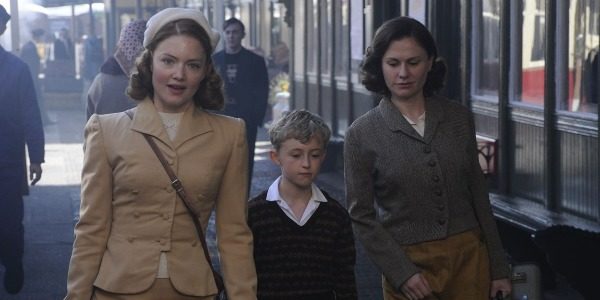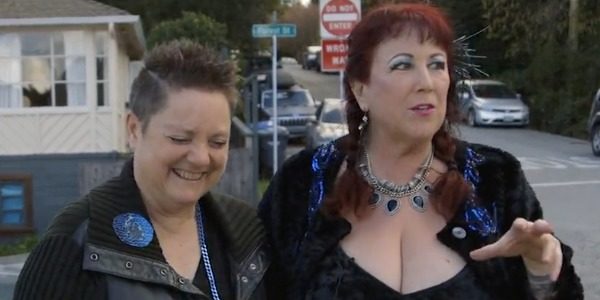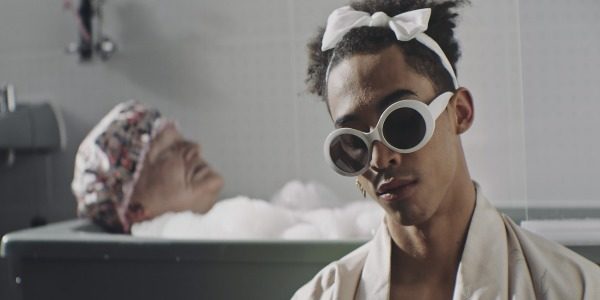BFI Flare Film Festival 2019: Drag, Drama & Saving Planet Earth

Becky spends her days working in TV and she spends…
2019 sees a wide range of films at London’s LGBTQ+ film festival, BFI Flare. As with previous years, the films are separated into three strands (Hearts, Minds, Bodies) with shorts and features in each category.
It’s a unique festival – the voices that are heard here are ones that are often suppressed and unlikely to see the light of day in mainstream cinema. This year’s festival has a number of films from countries where homosexuality is actually illegal or unacceptable in society (Rafiki, The Silk and the Flame) – the directors and teams that have worked on these are persevered to get their stories heard.
With the highly anticipated Vita and Virginia (Chanya Button) opening the festival and Justin Kelly‘s JT Leroy closing it, BFI Flare looks to have an incredibly exciting programme this year.
For our first dispatch, we focus on Annabel Jankel‘s Tell it to the Bees, Annie Sprinkle and Beth Stephens‘s ecosexuality documentary Water Makes Us Wet and Jamie Patterson‘s Tucked. All three films draw their strength from the central partnership portrayed between their protagonists, and present us with vast range of scenarios to explore.
Tell it to the Bees (Annabel Jankel)

The first rule when adapting a beloved novel for screen is to avoid upsetting the existing fan-base – a rule which Tell it to the Bees has categorically decided to throw out of the window. Despite this initial fan furore, Tell it to the Bees is a charming and sweet story of love against the odds, and though it initially sells itself as a tame affair hidden away in the Scottish countryside, the film attempts to tackles several serious issues including domestic violence, forced abortion and homophobia.
Directed by Annabel Jankel (yes, the same Annabel Jankel that directed the Super Mario Bros movie), Tell it to the Bees enlists an impressive cast – Holliday Grainger, Anna Paquin, Kate Dickie all star in addition to newcomer Gregor Selkirk who plays Charlie, the film’s young protagonist. Told from Charlie’s perspective, Tell it to the Bees details the struggles of Charlie’s mother Lydia (Grainger) as she struggles financially and emotionally after being left by Charlie’s father. The small Scottish town in which Bees is set is the perfect backdrop for gossip and Lydia finds herself at the heart of this rumour-mill when she strikes up a camaraderie with the local Doctor, Jean Markham (Paquin) – both women being relative outcasts. Jean’s recent return to the town dredges up a past that she would rather have hidden, but soon Jean and Lydia discover that there is more to their burgeoning relationship than just friendship.
It’s slightly surprising that Paquin is cast as a native Scot considering the widely criticised accent she used in The Piano, but this is 25 years later and although Paquin doesn’t always hit the right notes, she’s believable in the role as Dr Jean, struggling with accepting her identity and her career in the shadow of her father. Holliday Grainger is also perfect in her role opposite Paquin as single mother Lydia, trying to hold down a job whilst dealing with her husband – a man that is best characterised as a ‘nasty piece of work’. Lydia is more easily likeable than Jean – she’s an extrovert with a sociable past who is bold in her beliefs and in herself, whereas Jean’s self-hatred is more difficult to portray on-screen without it just coming across as self-centred.
Bees does have a certain BBC quality about it, which disperses in moments of real emotional and physical distress, but returns quickly to mundanity when those moments are over. It can’t quite decide if it wants to be an emotional gut-punch or a film to watch on a lazy Sunday with your parents as you remark on how much worse things used to be back in the day. The split between gritty realism and a comfortable kitchen sink drama, with a smattering of magic realism with the bees, feels confused and messy. The film works best when it allows the chemistry of Jean and Lydia to guide it, not when it attempts a sort of Ken Loach grittiness.
The violence and disgust that Jean and Lydia face is also oddly framed. The film certainly doesn’t enjoy their oppression but it does seem to imply that it is a learning curve for both of them – something that makes each of them stronger as individuals. This leaves a slightly bitter taste in the mouth – if Lydia and Jean grow more resilient because of this experience, then is townspeople’s treatment of them somehow justified? There is no come-uppance for any of the homophobia or hatred they receive, and the ending leaves a bitter taste in the mouth.
Tell it to the Bees might not know exactly what it wants to be, but there’s no denying Grainger and Pacquin’s chemistry, nor that Jankel knows how to pack a brutal emotional punch.
Water Makes Us Wet (Annie Sprinkle and Beth Stephens)

Do you know what an Ecosexual is? If, like me, you are hearing this term for the first time then fear not. Filmmakers, activists, artists, eco-warriors and entrepreneurs Annie Sprinkle and Beth Stephens are here to teach you all about Ecosexuality. Water Makes Us Wet is the second documentary by power-couple Annie and Beth and is all about … well, water.
Channelling sexuality and love for the environment, Beth and Annie work both behind the camera and in front of it as they travel across California to investigate why water is so important and all the ways in which humanity uses it. After short introduction to the idea of ecosexuality and discovering that they don’t really fit in with climate change activists nor the LGBTQ+ community, Beth and Annie’s road-trip explores sewage works, the ocean, reservoirs, dams, mountains and a place of emotional significance for Annie. Throughout their journey, the two speak to numerous experts, scientists, nature lovers and fellow travellers. Scientific exploration is mixed with cheeky sexual encounters – proving that the personal really is the political.
Planet Earth (voiced by Sandy Stone, an activist) guides us through Annie and Beth’s adventure, reeling off the ways in which humans take water for granted. Climate change is a huge part of the documentary, in addition to exposing the practices of uber-corporations who exploit the world’s biggest natural resource. A particular poignant segment sees Annie and Beth traipse up into the mountain-side to witness the siphoning off of water by Nestle. The result is that most of the wildlife struggle to survive without their natural water resource, particularly in the hot summer months. Whilst most of us probably don’t ascribe to the idea that water has emotions, one would be hard pushed not to find this set-up deeply disturbing.
Water Makes Us Wet is full of humour and heart, but even while they make us laugh, the clear and imminent effect of humanity on planet Earth is never far from their camera lens. It’s a triumph that Water Makes Us Wet is able to make complex issues so accessible, and it does this through Annie and Beth being so relatable. We are on that journey with them throughout everything they encounter. Tying in a very personal journey for Annie helps to cement Water Makes Us Wet as a truly engaging piece of filmmaking and one which speaks volumes about humanity’s relationship to Earth.
Tucked (Jamie Patterson)

A fairly typical story which doesn’t stray too much from the well-trodden path, Tucked brings a reinvigorated spirit to an old story in the form of two drag queens – Jackie and Faith.
Veteran of British television Derren Nesbitt is handed the meatier role here, playing ageing drag queen Jack ‘Jackie’ Collins. Tucked opens with Jackie on stage, a crowd laughing at her stand-up routine in as she moves around the room picking on unwitting audience members. Jackie is confident, bold and dirty – the style of drag that wouldn’t be out of place in a working men’s club. He’s old school. He is also, as we soon discover, dying. Given a rough estimate of six weeks to live by his doctor, Jackie resolves to spend his last days doing what he loves – stand-up at the club. A chance meeting with club newcomer Faith (Jordan Stephens – best known as artist and activist Rizzle Kicks) leads to an unlikely friendship and quasi father-son relationship (‘grandfather’).
One of the most interesting dynamics in Jamie Patterson’s film is between Faith and Jackie and occurs almost directly after their first meeting. After Faith has spent the night on Jackie’s sofa, the two of them share breakfast together and Jackie reveals that he isn’t gay – he was actually married to a woman for over 50 years and has a daughter that he is estranged from. Faith presses Jackie on the subject of gender – Faith’s own self-assuredness is offset by Jackie’s approach to it. Faith, at 21 years old, runs of a spiel about gender, fluidity and individuality whereas Jackie seems worn down by it all – he enjoys dressing in women’s clothes and perhaps in another life he would identify as transgender but for now, it is unimportant.
The idea of fluidity is a constant in Patterson’s Tucked – one of the more comedic scenes involve a drug dealer who becomes angry with Faith and Jackie when he doesn’t understand what they are. ‘It’s confusing’, he remarks once they’ve left. This tiny throwaway line underpins the truth of why many people cannot accept gender as being anything outside of two binaries. Things that confuse us are annoying, frustrating and unacceptable. At the heart of Tucked is a small voice saying that it is okay to be confused – everyone gets confused sometimes. Just be nice.
There are many parallels between Jackie and Faith’s journeys and it is not lost on the audience that one is at the beginning of their life and the other very much at the end of theirs. Their friendship has a kind of chemistry that is rarely achievable on-screen – much of the dialogue feels natural or improvised, which is to Tucked’s absolute credit. Stephens and Nesbitt are completely at ease with one another on-screen which helps cement the importance of this relationship, which is wholly believable even within the limited time period over which it occurs.
Much of Tucked is filled with one-take monologues which, while impressive, sometimes do not bring the kind of gravitas that one would expect it to. Nesbitt performs the monologues with gusto but they don’t always land – the dialogue sometimes feels too heavy handed or on the nose to be taken seriously. It’s a shame because Nesbitt is otherwise excellent as Jackie.
With such a serious subject matter (death), Tucked’s main triumph is that it manages to carry this story whilst being effortlessly funny. With glitter in abundance and some of the most beautiful thigh high boots, Tucked is an example of the excellent queer cinema that Britain has to offer.
BFI Flare Film Festival (London’s LGBTQ+ film festival) is running from 21st to 31st March 2019. See here for the full programme.
Does content like this matter to you?
Become a Member and support film journalism. Unlock access to all of Film Inquiry`s great articles. Join a community of like-minded readers who are passionate about cinema - get access to our private members Network, give back to independent filmmakers, and more.
Becky spends her days working in TV and she spends every other minute writing about cinema, TV & feminism. Based in London, she also likes drinking gin, re-watching 'The X Files' and writing about on-screen representation and all manner of things over at femphile.com













